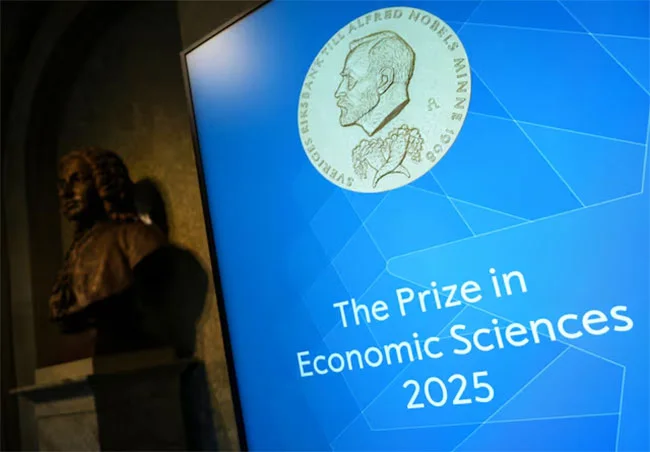XLM Insight | Stellar Lumens News, Price Trends & Guides
XLM Insight | Stellar Lumens News, Price Trends & Guides
So, the folks in Stockholm just handed out the 2025 Nobel Prize in Economics to a trio of academics for explaining "innovation-driven economic growth." Let's all give them a slow, sarcastic clap. Joel Mokyr, Philippe Aghion, and Peter Howitt are brilliant, I'm sure. But celebrating their work right now feels a bit like giving an award for "excellence in pyrotechnics" while the entire city is on fire.
The core idea they're being honored for is a souped-up version of Joseph Schumpeter's old banger: "creative destruction." You know the tune. A new, better thing comes along (the steam engine, the iPhone, an AI that writes your TPS reports) and blows up the old thing (the horse-drawn carriage, the flip phone, your entire career). It’s painful, sure, but it’s the engine of progress! The churn is necessary!
Give me a break.
This is the theory that every tech billionaire and venture capitalist whispers to themselves at night to justify gutting another industry. It’s the academic seal of approval for the corporate carnage we see every day. They get to be the "creators," and the rest of us just get the "destruction." That ain't progress, that's a hostile takeover of reality, and now it has a shiny gold medal.
Let's break down what these guys actually did. One half of the prize went to Joel Mokyr, who dug through history to figure out why the Industrial Revolution actually stuck when other bursts of innovation just fizzled out. His big idea? Society needs more than just knowing that a new gadget works; it needs to understand why it works. He calls it "propositional knowledge." It’s the deep science behind the tech.
This is a fantastic point, and also a terrifying one in 2025. Does anyone, and I mean anyone, at the big AI labs truly understand why their models work? They can describe the architecture, sure, but the emergent properties? The reasoning? It’s a black box we’re all praying doesn’t decide one day that the most efficient way to organize paperclips is to turn the entire planet into one. We’re building the next stage of human existence on a foundation of trial-and-error, not deep understanding. So, according to Mokyr's own prize-winning logic, are we just setting ourselves up for a historical fizzle? Or something much, much worse?

Then you've got Aghion and Howitt, who took the "creative destruction" concept and turned it into elegant, cold, hard math. They built the models that show how a company innovates, gets a temporary monopoly, makes a killing, and then immediately gets targeted by the next innovator who wants to knock them off the throne. It’s a beautiful, self-perpetuating cycle of slaughter. Their work is the intellectual backbone for why your favorite app gets "updated" into an unusable mess of ads, or why a perfectly good company gets acquired and dismantled for its patent portfolio. It’s just business, baby. The model says so.
It’s all just so neat and tidy on a whiteboard. It's like designing a perfect, efficient slaughterhouse. The diagrams look clean, the process is streamlined, but you conveniently ignore the screaming. This is a bad idea. No, 'bad' doesn't cover it—this is a five-alarm dumpster fire of an ideology to be celebrating right now.
I remember getting the email. A piece of software I'd used for a decade, a simple, elegant tool, was being "sunsetted" in favor of a new, subscription-based, cloud-integrated "solution" that barely worked. It was classic creative destruction. The old product was killed to make way for a new one that could generate recurring revenue. My workflow was destroyed, my data was held hostage, and for what? So a line on a quarterly report could go up. Offcourse, this is exactly what the models predict and encourage.
When John Hassler, the chair of the prize committee, says, "We must uphold the mechanisms that underlie creative destruction, so that we do not fall back into stagnation," what I hear is, "We must protect the right of massive corporations to fire 10,000 people over Zoom because a new AI can do their jobs, because progress." They tell us this is all for the best, that progress requires pain, and I just...
The laureates themselves seem to get the irony. Aghion is already out there warning about tech monopolies and protectionism. He’s accepting a prize for explaining the rules of the game while simultaneously pointing out that a few players have rigged the table and are about to flip it over. You have to wonder what that phone call felt like. Imagine, the sterile, polite voice from the Royal Swedish Academy of Sciences on the line, congratulating you for a theory that, in the real world, has become the justification for the very things you now fear. Then again, maybe I'm the crazy one here. Maybe we're all supposed to be thrilled about this.
Let's be real. This Nobel Prize isn't a celebration of human ingenuity. It's an obituary for stability. It’s the intellectual elite patting themselves on the back for describing the hurricane that's tearing apart the village, rather than helping anyone build a storm shelter. They’ve given us the perfect explanation for why everything feels so precarious and why our jobs are constantly under threat. Thanks, I guess. Now, if you'll excuse me, I have to go learn how to prompt an AI so it doesn't take my job next. Progress, right?